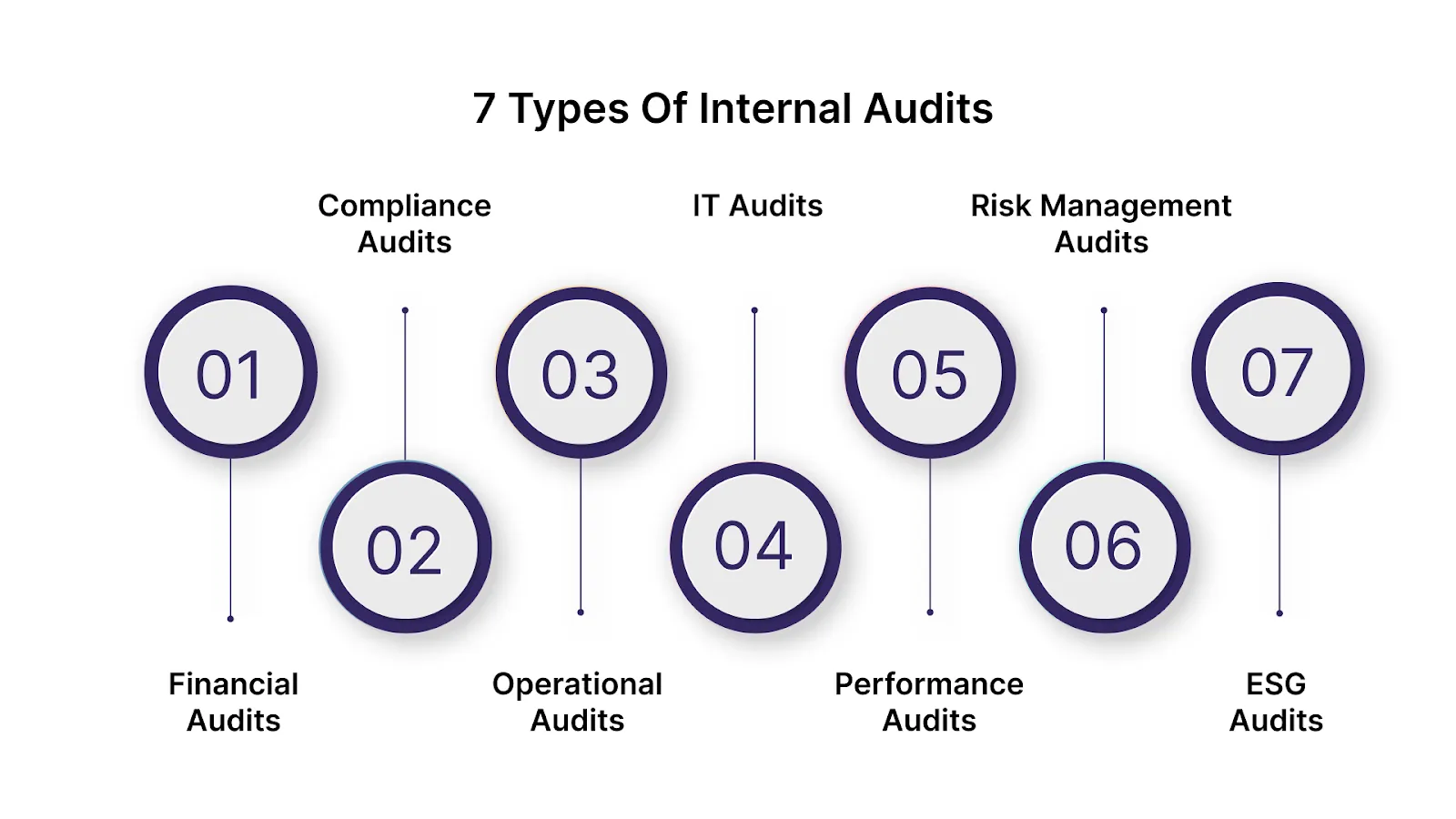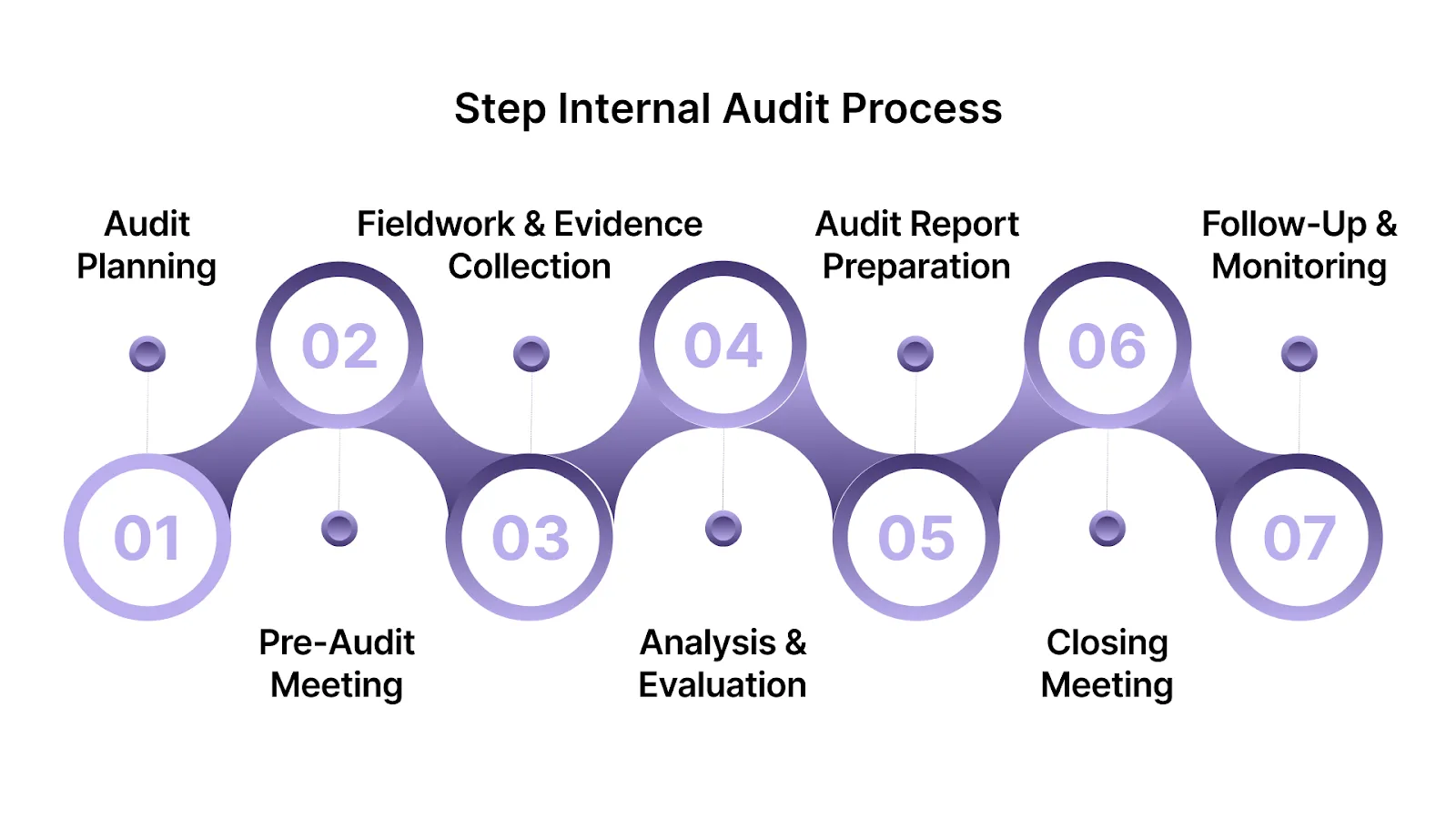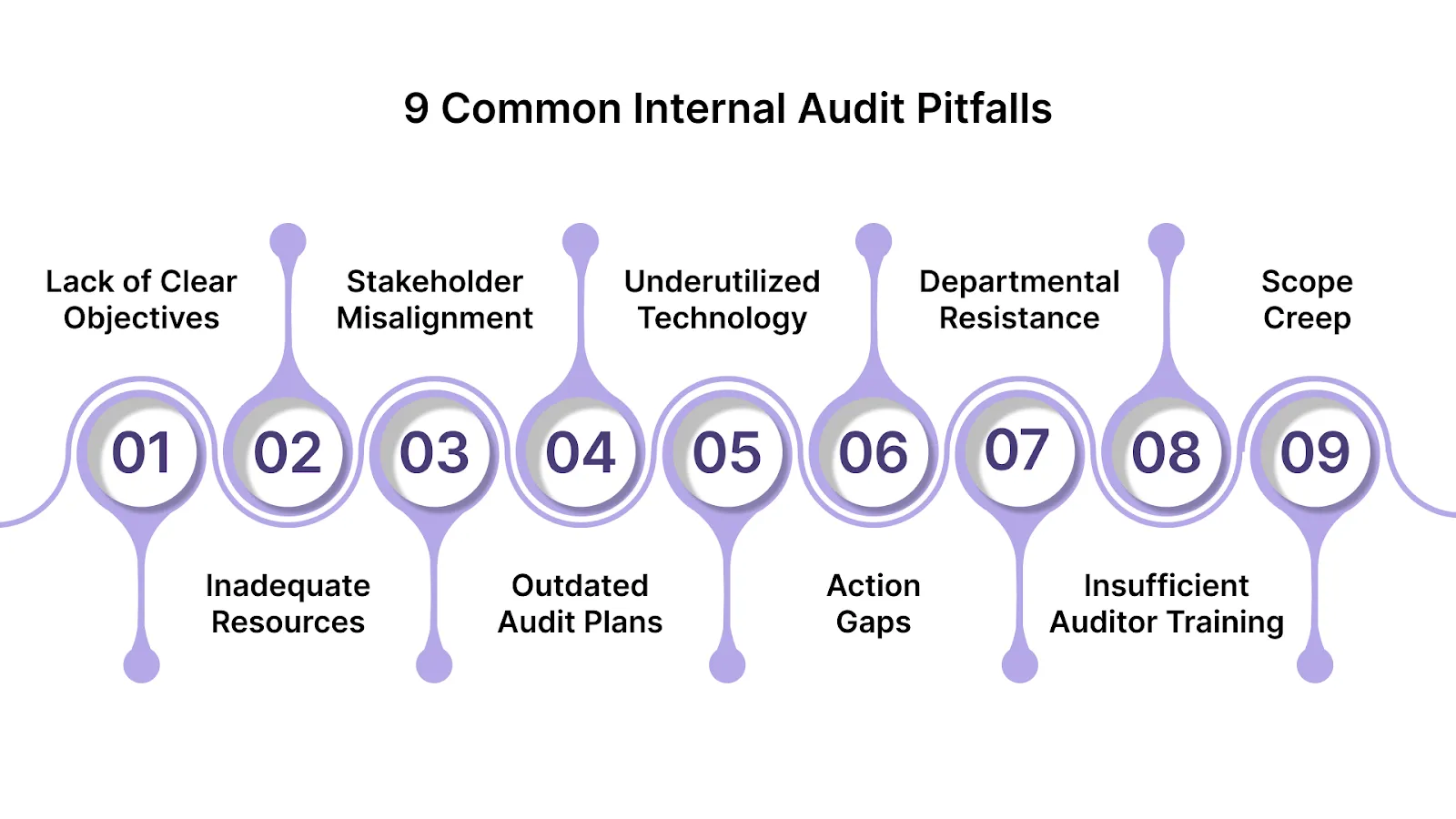Jun 3, 2025
Comprehensive Guide to Internal Audits and Their Importance

By Fraxtional LLC

An internal audit is essential for organizations aiming to ensure their operations are efficient, compliant, and aligned with strategic goals. In 2024, MDaudit's benchmark report revealed a fivefold increase in dollars at risk from payer audits, highlighting the critical need for robust internal audit processes in healthcare.
Similarly, a KPMG survey found that 76% of Australian companies are utilizing or testing AI in their financial processes, with full adoption projected within three years.
These examples highlight the importance of internal audits in identifying and mitigating risks, ensuring compliance, and enhancing operational efficiency. This guide will delve into what internal audits entail, their key benefits, and why they are an indispensable part of any organization’s risk management framework.
Overview
- Internal audits help organizations identify risks, ensure compliance, and improve operational efficiency.
- There are seven main types of internal audits, including financial, IT, compliance, and ESG audits.
- The 5 Cs, Compliance, Control, Consulting, Conformance, and Coordination, guide effective audit practices.
- Internal audits differ from external audits in purpose, scope, and reporting structure.
- Outsourced or fractional audit services, like Fraxtional, offer flexible solutions for organizations without in-house audit teams.
What is an Internal Audit?

An internal audit is a review conducted within an organization to assess its internal controls, risk management, and compliance with regulations. It aims to identify inefficiencies, gaps in processes, and potential risks, offering recommendations for improvement. Internal audits ensure the organization operates transparently, ethically, and efficiently.
For example, a mid-sized logistics company noticed recurring billing errors that cost them thousands each quarter. An internal audit uncovered inefficiencies in invoice processing and helped implement checks that eliminated these losses within three months.
Why are Internal Audits Important?

Internal audits play a crucial role in maintaining an organization's financial health and operational effectiveness. They provide insights into areas that may need improvement, mitigate risks, and ensure compliance with laws and regulations. Beyond identifying inefficiencies, internal audits help organizations stay ahead of potential threats and establish stronger governance frameworks. Here's why they are essential:
- Risk Mitigation: Internal audits help identify and mitigate risks before they escalate, reducing the chance of financial losses, legal penalties, or reputational damage.
- Regulatory Compliance: They ensure that organizations comply with industry standards, legal requirements, and internal policies, preventing costly fines and legal challenges.
- Operational Efficiency: By evaluating internal processes, audits uncover opportunities to streamline operations, reduce waste, and enhance productivity.
- Fraud Prevention: Regular audits help detect fraudulent activities by reviewing financial transactions and controls, making it harder for unethical practices to go unnoticed.
- Strategic Decision-Making: Internal audits provide valuable data that helps leadership make informed decisions about resource allocation, risk management, and business strategy.
For businesses that need expert compliance leadership or need to outsource audit functions, services like Fraxtional can provide on-demand, flexible solutions, ensuring that compliance and risk management are continually monitored without the overhead of a full-time hire.
7 Types of Internal Audits

There are several types of internal audits, each focusing on different aspects of an organization's operations. Here’s a breakdown of the key types:
1. Financial Audits: These audits focus on reviewing financial statements, transactions, and accounting systems to ensure accuracy and compliance with accounting standards and regulations.
Example: Research on grocery retailers showed that targeted inventory audits led to an 11% sales lift, demonstrating how record inaccuracies can be costly, but also reversible through audit intervention.
2. Compliance Audits: This type of audit ensures that the organization adheres to legal, regulatory, and internal policy requirements. It helps identify any areas where the organization might be at risk of non-compliance.
Example: A Connecticut mental‑health agency failed to properly document expense purchases and overtime, leading to tens of thousands in unaccounted costs uncovered through an audit.
3. Operational Audits: These audits assess the efficiency and effectiveness of business operations, identifying areas where processes can be improved to reduce costs, increase productivity, and streamline operations.
Example: A home goods e‑commerce client improved warehouse and fulfillment operations, picking efficiency increased by ~45%, packing by ~46%, and per‑order costs dropped by more than 50%.
4. IT Audits: IT audits focus on evaluating the organization's information systems, data security, and technology infrastructure. They ensure that systems are secure, efficient, and compliant with relevant regulations, such as GDPR or HIPAA.
Example: A large fintech‑sector application underwent rigorous pentesting and compliance checks, strengthening cybersecurity and regulatory alignment.
5. Performance Audits: These audits measure the performance of various departments or processes against pre-established goals or benchmarks. They provide insights into how well resources are being utilized and whether objectives are being met.
Example: A Global steel manufacturer engaged to improve procurement practices and optimized scrap purchasing, identified better timing and pricing control, delivering significant cost improvements.
6. Risk Management Audits: These audits assess how well an organization identifies, assesses, and manages various risks, such as financial, operational, or reputational risks. They help ensure that risk management processes are effective and up to date.
Example: KPMG documented how weak client onboarding controls in financial services expose firms to AML/KYC risk. Risk‑based auditing helps detect and prevent such regulatory gaps.
7. Environmental, Social, and Governance (ESG) Audits: With rising global focus on sustainability, ESG audits assess how well an organization’s practices align with environmental and social responsibility standards, along with governance structures that support ethical conduct.
Example: CISCO’s supply chain case highlights how audits and supplier collaboration encourage improvements in labor standards and ESG outcomes.
Difference Between Internal & External Audits
Internal and external audits play distinct but complementary roles in an organization. Internal audits focus on evaluating internal controls, risk management, and operational efficiency, helping improve business operations from within.
In contrast, external audits are conducted by independent third-party auditors to provide an objective review of the organization’s financial statements for compliance and accuracy. Below is a table summarizing the key differences between internal and external audits:
The 5 C’s of Internal Audit

The 5 Cs of Internal Audit refer to five key principles that guide the effectiveness and approach of internal auditing. These are essential for ensuring that audits are comprehensive, efficient, and valuable in identifying areas of risk and improving organizational operations. The 5 Cs are:
1. Compliance: Ensures that the organization adheres to laws, regulations, internal policies, and industry standards. Compliance audits help identify areas where the organization may be at risk of non-compliance and help mitigate potential legal and regulatory penalties.
2. Control: Focuses on assessing the effectiveness of internal controls. Internal audits examine processes and procedures to ensure that they are designed and functioning to protect the organization from fraud, errors, and operational inefficiencies.
3. Consulting: In addition to evaluating compliance and controls, internal auditors often provide consulting services to management. This involves advising on ways to improve processes, reduce risks, and enhance organizational performance, contributing to continuous improvement.
4. Conformance: Conformance refers to ensuring that audit processes and procedures align with professional standards, industry best practices, and the organization’s objectives. It helps maintain the integrity and quality of the audit process.
5. Coordination: Coordination involves collaborating with different departments and external auditors. It ensures that audit activities are well-organized and that key stakeholders are informed and involved in the audit process, improving efficiency and reducing duplication of efforts.
7-Step Internal Audit Process: From Planning to Actionable Insights

While the types and objectives of internal audits vary, the process typically follows a structured and repeatable sequence. This ensures audits are thorough, transparent, and deliver actionable insights. A well-executed audit doesn’t just identify risks, it drives continuous improvement and builds trust across departments.
Below, we break down the core steps of a standard internal audit process, designed to help organizations maintain control, mitigate risk, and operate more efficiently.
Step 1. Audit Planning
The process begins with defining the scope, objectives, and methodology of the audit. Auditors identify the business areas to be reviewed based on risk assessments, compliance requirements, or leadership priorities. At this stage, they also gather background information about the function, system, or department to be audited.
Example: A healthcare provider might prioritize HIPAA compliance as a focus area for Q1 due to recent regulatory changes.
Step 2. Pre-Audit Meeting (Opening Conference)
Auditors meet with key stakeholders to discuss the purpose of the audit, timelines, required documents, and team responsibilities. This meeting sets expectations and ensures cooperation throughout the audit.
Step 3. Fieldwork and Evidence Collection
During this phase, auditors collect qualitative and quantitative data through document reviews, process observations, system analysis, and staff interviews. The goal is to evaluate whether internal controls are effective and whether operations comply with relevant policies, laws, or industry standards.
Tools like audit management software and data analytics can accelerate and enhance the accuracy of this step.
Step 4. Analysis and Evaluation
Once evidence is gathered, auditors assess how well existing controls are working and identify any gaps, inefficiencies, or compliance risks. They prioritize findings based on severity and potential impact on the organization.
Step 5. Audit Report Preparation
A formal report is drafted, outlining key findings, risk ratings, and recommendations for improvement. The report is often reviewed by senior auditors or compliance leads before being shared with department heads or the audit committee.
A strong audit report balances objectivity with constructive feedback, encouraging action rather than resistance.
Step 6. Closing Meeting
Also called the exit conference, this is where auditors present their findings to management. Discussions revolve around clarifying any concerns, agreeing on next steps, and finalizing timelines for remediation.
Step 7. Follow-Up and Monitoring
Audits don’t end with a report. The final step involves tracking the implementation of recommendations, reassessing unresolved issues, and ensuring corrective actions are completed effectively. Many organizations use audit dashboards or tools to monitor progress in real time.
Why the Process Matters?
A standardized, transparent audit process builds credibility, reduces organizational friction, and ensures that audit outcomes are used to drive meaningful improvements. It also reinforces a proactive risk culture, where audits are seen not as a checkbox, but as a strategic enabler.
Also Read: Internal Audit Checklist for Effective Financial Assessment & Control
What Types of Organizations Have Internal Audits?

Internal audits are essential for a wide range of organizations across various industries. These audits help ensure compliance, identify risks, and improve operational efficiency. Below are the types of organizations that typically have internal audits:
1. Corporations (Private and Public): Large corporations, both publicly traded and privately held, often have internal audit departments to evaluate financial controls, operational effectiveness, and compliance with regulations. Public companies are required by law (e.g., Sarbanes-Oxley Act) to conduct internal audits to ensure accurate financial reporting and internal controls.
2. Government Agencies: Government bodies at all levels (federal, state, local) use internal audits to ensure that public funds are used efficiently, ethically, and in accordance with applicable laws. Internal audits in government organizations also help detect fraud and mismanagement.
3. Financial Institutions: Banks, credit unions, insurance companies, and other financial institutions use internal audits to manage financial risks, ensure compliance with banking regulations (e.g., Basel III, Dodd-Frank), and maintain the integrity of financial statements.
4. Nonprofit Organizations: Nonprofits also conduct internal audits to ensure that funds are used as intended, maintain transparency, and comply with legal and regulatory standards, especially for tax-exempt status and donor funds.
5. Healthcare Organizations: Hospitals, clinics, insurance companies, and pharmaceutical firms use internal audits to ensure compliance with healthcare regulations (e.g., HIPAA, FDA guidelines), optimize operational processes, and reduce the risk of fraud or misuse of funds.
6. Retail and Manufacturing Companies: Internal audits in retail and manufacturing sectors focus on inventory control, risk management, compliance with safety standards, and ensuring that financial reporting aligns with industry regulations.
7. Technology and IT Companies: Technology companies, especially those handling sensitive data or operating under stringent cybersecurity regulations (e.g., GDPR, CCPA), use internal audits to evaluate data security measures, compliance with privacy laws, and the integrity of software systems.
8. Educational Institutions: Universities, colleges, and schools often have internal audits to manage risks, ensure compliance with educational standards, and optimize financial management, including the use of government funding and grants.
9. Energy and Utility Companies: Internal audits in the energy sector focus on compliance with environmental regulations, safety protocols, and financial controls, while also addressing operational risks related to energy production and distribution.
10. Small and Medium Enterprises (SMEs): While smaller organizations may not have dedicated internal audit departments, SMEs still conduct internal audits or hire third-party firms to assess financial controls, compliance, and operational efficiencies, especially as they grow or face more regulatory scrutiny.
In all these organizations, Fraxtional can provide fractional internal audit services, offering expertise in risk management, compliance, and efficiency improvements without the need for a full-time internal audit team.
9 Common Internal Audit Pitfalls (And How to Solve Them)

Internal audits are essential for maintaining compliance, improving processes, and managing risk. But if not executed properly, they can waste time, miss key issues, or even create new risks. Below are common pitfalls and practical ways to overcome them.
1. Lack of Clear Objectives
The problem: Vague goals lead to unfocused audits and missed priorities.
The solution: Define clear, measurable audit objectives aligned with your business goals. A well-scoped audit delivers insights that drive better decisions.
2. Inadequate Resources
The problem: Limited time, talent, or tools reduce audit quality.
The solution: Budget for the right tools and expertise. If in-house bandwidth is limited, leverage on-demand support from audit professionals like Fraxtional.
3. Poor Communication with Stakeholders
The problem: Silence or misalignment leads to confusion and resistance.
The solution: Establish regular check-ins with leadership and department heads to align on priorities and ensure cooperation throughout the audit cycle.
4. Outdated Audit Plans
The problem: Risks evolve, but static audit plans don’t keep up.
The solution: Use real-time risk data and revisit your audit plan quarterly. A dynamic, risk-based approach ensures relevance and impact.
5. Underutilized Technology
The problem: Manual processes are slow and error-prone.
The solution: Adopt modern audit tools, like data analytics, automated risk detection, or cloud-based dashboards, to improve accuracy and speed.
6. Lack of Follow-Through on Recommendations
The problem: Without follow-up, issues repeat and risks persist.
The solution: Track audit findings with clear owners and deadlines. Tools like audit management platforms can automate this. Fraxtional helps businesses close the loop on audits with hands-on support.
7. Departmental Resistance
The problem: Teams see audits as a threat rather than a support system.
The solution: Frame audits as a value-add, not a fault-finding mission. Engage departments early and show how audits can strengthen their operations.
8. Insufficient Auditor Training
The problem: Untrained auditors may overlook risks or misinterpret data.
The solution: Provide ongoing professional development. Partnering with experts ensures the latest regulatory and industry insights inform audits.
9. Scope Creep
The problem: An unplanned audit expansion delays delivery and burns resources.
The solution: Clearly define and lock audit scope before kickoff. Revisit and adjust only when justified by risk.
Avoiding these pitfalls transforms audits from a routine task into a powerful business advantage. Whether you're building a new internal audit function or scaling an existing one, Fraxtional offers expert-led, flexible internal audit solutions, so you get high-impact results without the overhead.
Conclusion
Internal audits are critical for organizations to maintain transparency, ensure compliance, and mitigate risks. However, overcoming common pitfalls like a lack of clear objectives, inadequate resources, and resistance from departments is key to making audits effective.
For businesses seeking expert support in navigating the complexities of internal audits, Fraxtional helps organizations conduct thorough audits without the need for a full-time, in-house audit team. Whether you're looking to streamline your internal processes, ensure compliance, or improve operational efficiencies, Fraxtional is here to provide the expertise you need.
Is your internal audit strategy up to date? Let Fraxtional's experts guide your organization through complex compliance challenges and risk management. Contact us today to get started!
FAQs
It depends on the organization’s size, risk level, and industry. Typically, audits are done annually, but high-risk areas may require more frequent reviews.
Yes. Common certifications include Certified Internal Auditor (CIA), Certified Information Systems Auditor (CISA), and Certified Fraud Examiner (CFE).
Yes. Audits promote transparency, accountability, and ethical practices across the organization.
Modern audits use data analytics, automation tools, and risk management software to improve accuracy and efficiency.
Findings are shared through reports highlighting key issues, risks, and actionable recommendations.
When lacking in-house expertise or needing flexible, expert-led audits, solutions like Fraxtional can help.
blogs
Don’t miss these
Let’s Get Started
Ready to Strengthen Your Compliance Program?
Take the next step towards expert compliance solutions. Connect with us today.




